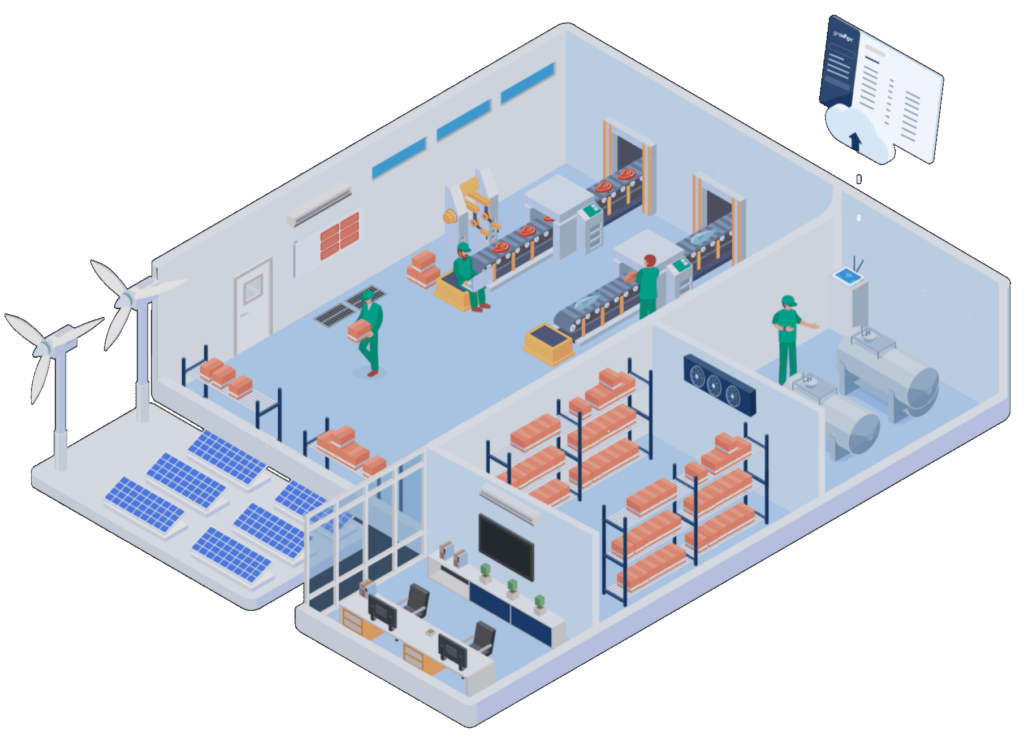Gradhoc
Sustainability in Food Industry. Cooling Technology
Smart refrigeration, cooler future
Request a demo or a quote
Request a demo adapted both to your sector and to your specific needs, with a focus on sustainability in food industry.
Gradhoc
Optimize your Environmental Indicators and Reduce Energy Costs by up to 40% with Smart Intelligence
Sustainability departments in large food companies face growing challenges in managing environmental indicators (GWP, TEWI, ODS) while ensuring food safety and product traceability. These challenges are particularly pronounced when addressing sustainability in food industry goals, which require a delicate balance between environmental responsibility and the need for efficient, traceable production processes.
Refrigeration system data is often scattered across multiple locations and diverse equipment, hindering continuous access to critical information such as temperatures, equipment status, and energy costs.
This fragmentation complicates the creation of essential documents—sustainability reports, HACCP analyses, and waste prevention plans—and increases reliance on production and maintenance teams. Without precise and continuous data, many indicators are estimated inaccurately, resulting in reduced efficiency.
The innovative Smart Cooling platform automates data acquisition and analysis, leveraging AI and advanced algorithms to achieve energy cost reductions of up to 40% and CO₂ emissions reductions of up to 35%.
Do you have an intelligent system in place to optimize your indicators? Let’s talk.

Concerns of Sustainability Managers: |
|---|
Complex management of environmental indicators (GWP, TEWI, ODS). |
Ensuring food safety and product traceability. |
Challenges in preparing essential documents, such as sustainability reports, HACCP analyses, and waste prevention plans. |
Limited access to critical information on temperatures, equipment status, and energy costs due to data dispersion across multiple locations and devices. |
High dependency on production and maintenance departments for data collection and validation. |
Inaccurate estimation of key indicators caused by the lack of precise and continuous data. |
Reduced operational efficiency resulting from the absence of a centralized and intelligent system. |
Gradhoc
With Gradhoc you overcome these challenges and sustainability in food industry
Gradhoc is a cloud-based software solution tailored for the agri-food industry, designed to optimize refrigeration processes and ensure the seamless operation of critical facilities. For Sustainability Managers, this platform provides the tools to advance corporate environmental goals while driving efficiency and compliance.
By leveraging cutting-edge technologies such as IoT, AI, and digital twins, Gradhoc ensures continuous monitoring of refrigeration systems, predicts potential inefficiencies, and implements corrective measures before issues escalate. This proactive approach reduces the energy intensity of operations and minimizes waste, directly supporting sustainability initiatives, within the sustainability in food industry.
Gradhoc also offers real-time energy monitoring and advanced management capabilities, enabling companies to reduce energy consumption, meet strict environmental standards, and significantly lower their carbon footprint. These features empower Sustainability Managers to align operational practices with corporate ESG commitments and regulatory requirements—ultimately advancing sustainability in food industry while ensuring your refrigeration systems operate efficiently today and into the future.
With Gradhoc, you not only address the challenges faced by Sustainability Managers as outlined above, but you also contribute to achieving the objectives of other departments within the organization. Align your goals and foster strategic collaboration with your fellow managers!
Concerns from other areas of the Organization | Maintenance | Quality | IT | Production | Finance | R&D |
|---|---|---|---|---|---|---|
Reactive system management: reliance on corrective maintenance. | ||||||
Excessive on-site manual interventions. | ||||||
Reduced equipment and machinery lifespan. | ||||||
High costs: energy and maintenance expenses. | ||||||
Challenges in ensuring food safety. | ||||||
Difficulties in documenting HACCP (Hazard Analysis and Critical Control Points). | ||||||
Regulatory compliance: food safety, energy reduction, and food waste minimization. | ||||||
Product losses and food waste. | ||||||
Production downtime. | ||||||
Difficulty in achieving product temperature traceability. | ||||||
Data management issues: absence of data or inconsistent data streams. | ||||||
Heterogeneous information from different manufacturers and sources. | ||||||
Deployment of monolithic solutions with limited integration capability. | ||||||
Disaggregated information across various refrigeration subsystems. | ||||||
Specialized maintenance requiring dedicated personnel. | ||||||
Excessive personnel involvement in operational tasks. | ||||||
Employee stress: unplanned tasks, emergencies, or production halts. | ||||||
Legacy technologies with limited traceability in processes. |
Gradhoc
The Future of Sustainability in the Food Industry
The sustainability in food industry has become a pivotal concern for businesses worldwide. As consumers grow increasingly conscious of environmental impacts, companies must address the sustainability challenges that arise within their operations. A key aspect of achieving a sustainable industry is adapting production processes to minimize waste, energy consumption, and environmental damage.
However, the path to sustainability is fraught with sustainability challenges. Businesses must invest in innovative technologies and sustainable practices to meet the rising expectations for environmental responsibility. This transition requires significant effort across multiple sectors, including the sustainability in food industry, where supply chains must become more efficient, reducing carbon footprints while ensuring that the quality of products is maintained.
The sustainability in fishing industry plays a crucial role in this global effort. Overfishing and unsustainable practices have contributed to the depletion of marine resources, making it essential for the fishing industry to adapt. Addressing sustainability challenges in the fishing sector is paramount to ensuring the long-term viability of both marine ecosystems and the industries reliant on them.
In conclusion, creating a sustainable industry requires a multi-faceted approach that addresses the specific sustainability challenges faced by various sectors. The sustainability in fishing industry is just an example where business must take proactive steps to ensure they contribute to a greener, more sustainable future.
Gradhoc
Will you prepare for change?
Fill out the form to request a demo or a quote